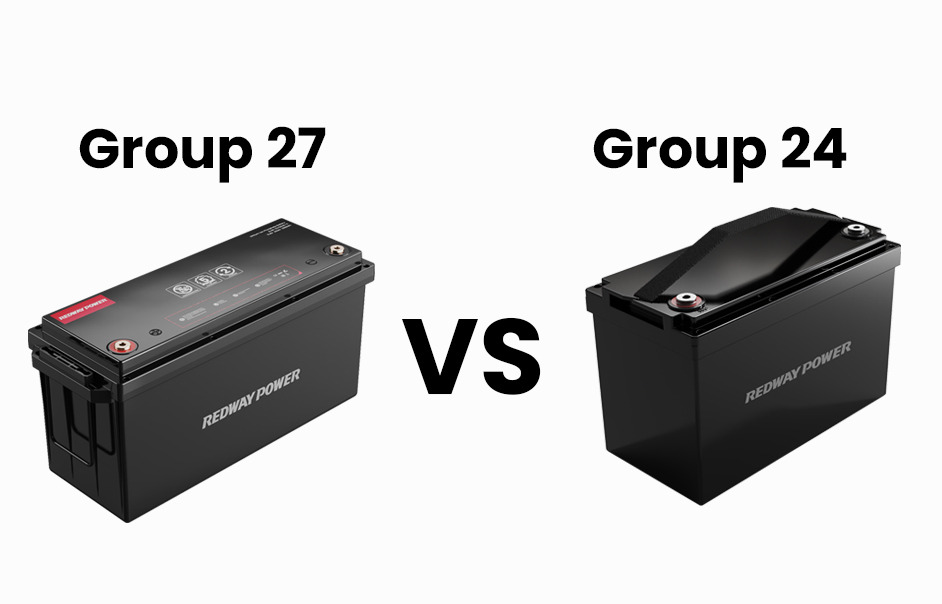When it comes to powering your vehicle, marine vessel, or RV, the type of battery you choose can significantly impact performance and longevity. Group 27 and Group 24 batteries are two popular options on the market, each with its own set of characteristics and advantages. In this comprehensive guide, we'll delve into the differences between these two battery types to help you make an informed decision.

1. Introduction to Group 27 and Group 24 batteries
Group 27 and Group 24 batteries belong to the same family of lead-acid batteries commonly used in automotive, marine, and recreational vehicle applications. While they share similarities in design and functionality, there are distinct differences that set them apart.
2. Physical dimensions and compatibility
Size and weight differences
One of the primary distinctions between Group 27 vs 24 batteries lies in their physical dimensions. Group 27 batteries are typically larger and heavier than their Group 24 counterparts, making them better suited for applications where space is not a constraint.
Application compatibility
Group 27 batteries are commonly used in larger vehicles and boats where higher power output and longer runtime are desired. On the other hand, Group 24 batteries are more compact and are often chosen for smaller vehicles or tight spaces where size matters.
3. Capacity and power output
Comparison of amp-hour ratings
When it comes to capacity, Group 27 batteries generally offer higher amp-hour ratings compared to Group 24 batteries. This means they can store more energy and deliver longer-lasting performance, making them ideal for applications that demand sustained power over extended periods.
Voltage and cranking amps
Both Group 27 and Group 24 batteries typically operate at the same voltage, but Group 27 batteries may have higher cranking amps, providing more starting power in cold weather conditions.
4. Lifespan and durability
Maintenance requirements
Group 27 batteries may require slightly more maintenance compared to Group 24 batteries due to their larger size and higher capacity. However, proper care and regular maintenance can extend the lifespan of both battery types.
Resistance to vibration and shock
Group 27 batteries are often built to withstand more rugged conditions, making them a preferred choice for off-road vehicles and marine applications where vibrations and shocks are common.
5. Pricing and affordability
Initial cost comparison
Group 27 batteries tend to be more expensive upfront due to their larger size and higher capacity. However, they may offer better value in the long run due to their longer lifespan and superior performance.
Long-term value considerations
When evaluating the cost-effectiveness of Group 27 vs Group 24 batteries, it's essential to consider factors such as lifespan, maintenance requirements, and overall performance to determine the best value for your specific needs.
6. Environmental impact and sustainability
Material composition
Both Group 27 and Group 24 batteries are typically made from lead-acid, which raises concerns about environmental impact and recycling. However, efforts are underway to develop more sustainable battery technologies with reduced environmental footprint.
Recycling options
Many battery manufacturers offer recycling programs for old batteries to minimize environmental impact and promote sustainability. Proper disposal and recycling of batteries are crucial to prevent pollution and conserve natural resources.
7. Common misconceptions and myths
Debunking false claims
There are several misconceptions surrounding Group 27 and Group 24 batteries, including myths about their performance, lifespan, and compatibility. It's essential to separate fact from fiction to make an informed decision when selecting a battery for your specific application.
8. Best applications for Group 27 and Group 24 batteries
Automotive
Group 27 batteries are well-suited for larger vehicles such as trucks, SUVs, and commercial vehicles that require robust power output and reliability. Group 24 batteries are ideal for smaller cars and compact vehicles where space is limited.
Marine
In marine applications, Group 27 batteries are preferred for larger boats and yachts with high electrical demands, such as trolling motors and onboard electronics. Group 24 batteries are suitable for smaller vessels and personal watercraft where space is a consideration.
RV and solar applications
Group 27 batteries are commonly used in RVs and campers to provide auxiliary power for appliances, lighting, and electronics. Group 24 batteries are suitable for smaller RVs and trailers where weight and space constraints are critical.
9. Choosing the right battery for your needs
Factors to consider
When choosing between Group 27 and Group 24 batteries, consider factors such as size, capacity, power output, maintenance requirements, and long-term value to ensure compatibility with your specific application and usage requirements.
Recommendations based on usage
Consult with a knowledgeable battery specialist or technician to determine the best battery option for your vehicle, boat, or RV based on your power needs, space constraints, and budget considerations.
10. Installation and maintenance tips
Proper installation procedures
Follow manufacturer guidelines and recommendations for installing and connecting Group 27 or Group 24 batteries to ensure safe and reliable operation. Improper installation can lead to performance issues and safety hazards.
Maintenance schedules and practices
Establish a regular maintenance schedule for inspecting and maintaining your battery, including checking fluid levels, cleaning terminals, and monitoring charging status. Proper maintenance can extend the lifespan and performance of your battery.
11. Future trends in battery technology
Advancements in energy storage
The battery industry is continually evolving, with ongoing research and development focused on improving energy storage capacity, efficiency, and sustainability. Future advancements in battery technology may lead to more environmentally friendly and cost-effective solutions for powering vehicles and equipment.
Impact on Group 27 and Group 24 batteries
As battery technology continues to advance, Group 27 and Group 24 batteries may benefit from innovations such as lithium-ion technology, which offers higher energy density and longer lifespan compared to traditional lead-acid batteries.
12. Conclusion
In conclusion, Group 27 and Group 24 batteries are both viable options for powering automotive, marine, and recreational vehicles. Each battery type has its own unique characteristics and advantages, making them suitable for different applications and usage scenarios. By understanding the differences between these two battery types and considering factors such as size, capacity, power output, and long-term value, you can make an informed decision when selecting the right battery for your power needs.
FAQs
1. Are Group 27 batteries always better than Group 24 batteries?
Not necessarily. The suitability of a Group 27 or Group 24 battery depends on factors such as application, space constraints, power requirements, and budget considerations.
2. Can I replace a Group 24 battery with a Group 27 battery?
In some cases, yes. However, it's essential to ensure compatibility with your vehicle or equipment and consider factors such as physical dimensions, power output, and electrical system requirements.
3. Do Group 27 batteries require more maintenance than Group 24 batteries?
Group 27 batteries may require slightly more maintenance due to their larger size and higher capacity. However, proper care and regular maintenance can help maximize the lifespan and performance of both battery types.
4. Are Group 27 batteries more environmentally friendly than Group 24 batteries?
Both Group 27 and Group 24 batteries are typically made from lead-acid, which raises environmental concerns. However, efforts are underway to develop more sustainable battery technologies with reduced environmental impact.
5. What is the lifespan of Group 27 and Group 24 batteries?
The lifespan of a battery depends on various factors, including usage patterns, maintenance practices, and environmental conditions. On average, Group 27 batteries may have a slightly longer lifespan than Group 24 batteries due to their higher capacity and durability.
